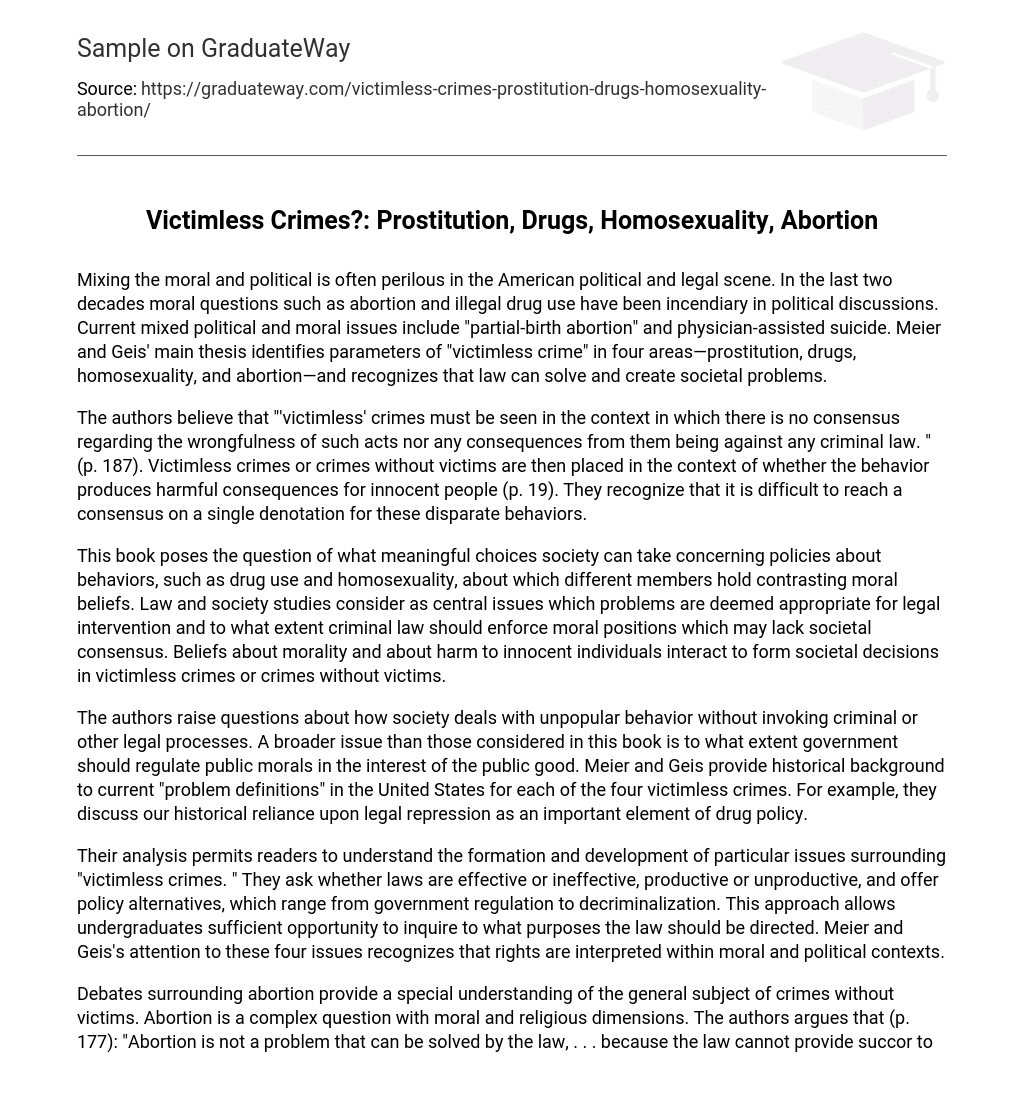Mixing the moral and political is often perilous in the American political and legal scene. In the last two decades moral questions such as abortion and illegal drug use have been incendiary in political discussions. Current mixed political and moral issues include “partial-birth abortion” and physician-assisted suicide. Meier and Geis’ main thesis identifies parameters of “victimless crime” in four areas—prostitution, drugs, homosexuality, and abortion—and recognizes that law can solve and create societal problems.
The authors believe that “‘victimless’ crimes must be seen in the context in which there is no consensus regarding the wrongfulness of such acts nor any consequences from them being against any criminal law. ” (p. 187). Victimless crimes or crimes without victims are then placed in the context of whether the behavior produces harmful consequences for innocent people (p. 19). They recognize that it is difficult to reach a consensus on a single denotation for these disparate behaviors.
This book poses the question of what meaningful choices society can take concerning policies about behaviors, such as drug use and homosexuality, about which different members hold contrasting moral beliefs. Law and society studies consider as central issues which problems are deemed appropriate for legal intervention and to what extent criminal law should enforce moral positions which may lack societal consensus. Beliefs about morality and about harm to innocent individuals interact to form societal decisions in victimless crimes or crimes without victims.
The authors raise questions about how society deals with unpopular behavior without invoking criminal or other legal processes. A broader issue than those considered in this book is to what extent government should regulate public morals in the interest of the public good. Meier and Geis provide historical background to current “problem definitions” in the United States for each of the four victimless crimes. For example, they discuss our historical reliance upon legal repression as an important element of drug policy.
Their analysis permits readers to understand the formation and development of particular issues surrounding “victimless crimes. ” They ask whether laws are effective or ineffective, productive or unproductive, and offer policy alternatives, which range from government regulation to decriminalization. This approach allows undergraduates sufficient opportunity to inquire to what purposes the law should be directed. Meier and Geis’s attention to these four issues recognizes that rights are interpreted within moral and political contexts.
Debates surrounding abortion provide a special understanding of the general subject of crimes without victims. Abortion is a complex question with moral and religious dimensions. The authors argues that (p. 177): “Abortion is not a problem that can be solved by the law, . . . because the law cannot provide succor to those whose evaluations are not represented in law. ” Pro-life advocates argue that the alleged victim is the aborted fetus.
On issues concerning homosexuality, Meier and Geis discuss political aspects of the gay/lesbian/bisexual movement and the role of law in liberating or repressing the rights of these individuals. They discuss whether homosexuality can have a protected status under anti-discrimination laws and the fourteenth Amendment to the United States Constitution. Leaders in the community, law enforcement and political arenas have questioned national and state policies against the illegal use of drugs.
The authors consider how these policies raise key questions about the scope and effectiveness of criminal laws and argue that drug policy might be clarified if direct connections could be drawn between drug use and crime. They discuss key policy issues surrounding drug sentencing and enforcement activities, such as differential federal sentencing for possession crack and powder cocaine. The United States Sentencing Commission has recently recommended a policy solution that might diminish these differences.





